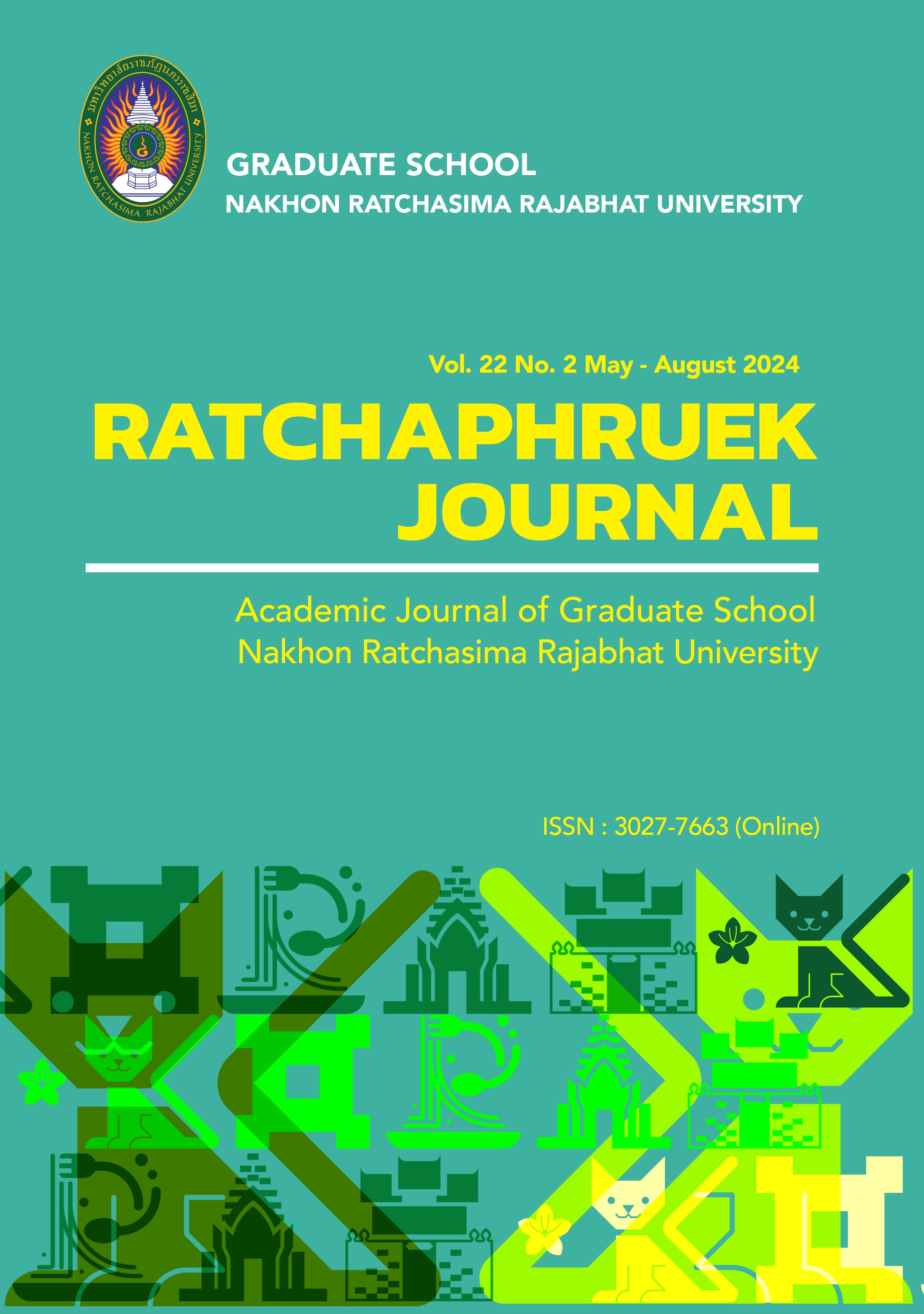Relationships among Time Management, Academic Self-Efficacy, Mental Fatigue, and Academic Burnout of Undergraduates Since the COVID-19 Pandemic
Main Article Content
Abstract
The purpose of this research is to study the relationship among time management, academic self-efficacy, mental fatigue, and academic burnout in undergraduate students since the COVID-19 pandemic using a convergent mixed-method approach. Two groups of students participated in the research: 320 students for the quantitative study and 14 students, consisting of high and low academic burnout score groups, for the qualitative study. Findings revealed that the relationship model of time management, academic self-efficacy, mental fatigue, and academic burnout fit well with the empirical data (Chi-square = 15.87, df = 10, p = .10, CFI = 0.993, GFI = 0.990, and RMSEA = 0.043). The three variables in the model explained 57% of the variance in academic burnout. Mental fatigue was the most significant factor, followed by time management and academic self-efficacy, respectively. The qualitative study showed that there were three main themes in both high and low-score groups: 1) Academic burnout experiences, 2) Factors contributing to academic burnout, and 3) Coping with burnout.
Article Details

This work is licensed under a Creative Commons Attribution-NonCommercial-NoDerivatives 4.0 International License.
References
นิตยา มณีวงศ์. (2564). ศึกษาพฤติกรรมและปัจจัยความสำเร็จการเรียนออนไลน์แอปพลิเคชันไลน์ ในช่วงวิกฤต COVID-19. ครุศาสตร์สาร, 15(1), น. 161-173.
พันธนีย์ ธิติชัย และภันทิลา ทวีวิกยการ. (2564). รายงานผลการทบทวนสถานการณ์โรคโควิด-19 และมาตรการควบคุมป้องกัน ในระดับโลก และในประเทศไทย. นนทบุรี: กรมควบคุมโลก.
พีรพรรณ ธีรบุษยเวศย์. (2562). ทัศนคติต่อภูมิทัศน์ด้านการส่งเสริมความรู้สึกถึงการฟื้นคืนพลังจากความเหนื่อยล้าทางจิตใจ (วิทยานิพนธ์มหาบัณฑิต, จุฬาลงกรณ์มหาวิทยาลัย).
ศูนย์กลางข้อมูลเปิด. (2565). ข้อมูลสถิติจำนวนนักศึกษาปัจจุบัน ปีการศึกษา 2564 จำแนกตามกลุ่มสถาบัน ชื่อสถาบัน คณะ สาขาวิชา ระดับการศึกษา และเพศ. สืบค้นเมื่อ 27 พฤศจิกายน 2565, จาก https://data.mhesi.go.th/dataset/univ_std_11_01
Adams, G. A. & Jex, S. M. (1997). Confirmatory factor analysis of the time management behaviour scale. Psychological Reports, 80, pp. 225-226.
Amin, A. M., Rabiei, M., Amirkhiz, S. Y. Y. & Shomoossi, N. (2024). We are still to learn from our learners: A hidden curriculum developed during the covid-19 pandemic. Teaching and Teacher Education, 137, p. 104390.
Creswell, J. W. & Creswell, J. D. (2018). Research design: Qualitative, quantitative, and mixed methods approaches. CA: Sage.
Giorgi, A., Giorgi, B. & Morley, J. (2017). The descriptive phenomenological psychological method. In C. Willig & W. Stainton-Rogers (Eds.), The SAGE handbook of qualitative research in psychology (pp. 176-192). Thousand Oaks, CA: Sage.
Gündoǧan, S. & Seçer, İ. (2022). Coping with School Burnout. Psikiyatride Guncel Yaklasimlar, 14(3), pp. 331-339.
Hopstaken, J. F., Linden, D., Bakker, A. B. & Kompier, M. A. J. (2015). The window of my eyes: Task disengagement and mental fatigue covary with pupil dynamics. Biological Psychology, 110, pp. 100-106.
Johansson, B. & Ronnback, L. (2014). Evaluation of the mental fatigue scale and its relation to cognitive and emotional functioning after traumatic brain injury or stroke. International Journal of Physical Medicine & Rehabilitation, 2(1), p. 1000182.
Jung, I., Kim, J.-h., Ma, Y. & Seo, C. (2015). Mediating effect of academic self-efficacy on the relationship between academic stress and academic burnout in Chinese adolescents. International Journal of Human Ecology, 16(2), pp. 63-77.
Kirikkanat, B. (2023). COVID-19 Related Stress and Life Satisfaction in Turkish Undergraduates: A Serial-Parallel Mediation Model. European Journal of Psychology and Educational Research, 6(1), pp. 23-31.
Kordzanganeh, Z., Bakhtiarpour, S., Hafezi, F. & Dashtbozorgi, Z. (2021). The relationship between time management and academic burnout with the mediating role of test anxiety and self-efficacy beliefs among university students. Journal of Medical Education, 20(1), p. e112142. Retrieved October 22, 2021 from https:// brieflands.com/articles/jme-112142
Kristina, A. D., Loekmono, J. T. L. & Setyorini, S. (2020). The effect of role conflict on academic burnout of undergraduate Economics students. International Journal of Research in Counseling and Education, 4(2), pp. 98-103.
Pintrich, P. R., Smith, D. A., Garcia, T. & McKeachie, W. J. (1993). Reliability and predictive validity of the Motivated Strategies for Learning Questionnaire (MSLQ). Educational and psychological measurement, 53(3), pp. 801-813.
Schaufeli, W. B., De Witte, H. & Desart, S. (2019). User Manual-Burnout Assessment Tool (BAT)-Version 2.0. KU Leuven, Belgium: Internal report.


